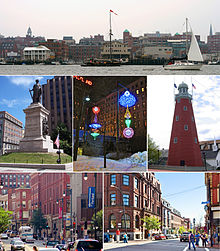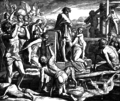Portal:Cities
The Cities Portal

A city is a human settlement of a notable size. The term "city" has different meanings around the world and in some places the settlement can be very small. Even where the term is limited to larger settlements, there is no universally agreed definition of the lower boundary for their size. In a more narrow sense, a city can be defined as a permanent and densely settled place with administratively defined boundaries whose members work primarily on non-agricultural tasks. Cities generally have extensive systems for housing, transportation, sanitation, utilities, land use, production of goods, and communication. Their density facilitates interaction between people, government organizations, and businesses, sometimes benefiting different parties in the process, such as improving the efficiency of goods and service distribution.
Historically, city dwellers have been a small proportion of humanity overall, but following two centuries of unprecedented and rapid urbanization, more than half of the world population now lives in cities, which has had profound consequences for global sustainability. Present-day cities usually form the core of larger metropolitan areas and urban areas—creating numerous commuters traveling toward city centres for employment, entertainment, and education. However, in a world of intensifying globalization, all cities are to varying degrees also connected globally beyond these regions. This increased influence means that cities also have significant influences on global issues, such as sustainable development, climate change, and global health. Because of these major influences on global issues, the international community has prioritized investment in sustainable cities through Sustainable Development Goal 11. Due to the efficiency of transportation and the smaller land consumption, dense cities hold the potential to have a smaller ecological footprint per inhabitant than more sparsely populated areas. Therefore, compact cities are often referred to as a crucial element in fighting climate change. However, this concentration can also have significant negative consequences, such as forming urban heat islands, concentrating pollution, and stressing water supplies and other resources. (Full article...)
Selected city -
Portland (/ˈpɔːrtlənd/ PORT-lənd) is the most populous city in the U.S. state of Maine and the seat of Cumberland County. Portland's population was 68,408 in April 2020. The Greater Portland metropolitan area has a population of approximately 550,000 people. Historically tied to commercial shipping, the marine economy, and light industry, Portland's economy in the 21st century relies mostly on the service sector. The Port of Portland is the second-largest tonnage seaport in the New England area as of 2019.
The city seal depicts a phoenix rising from ashes, a reference to Portland's recovery from four devastating fires. Portland was named after the English Isle of Portland. In turn, the city of Portland, Oregon, was named after Portland, Maine. The word Portland is derived from the Old English word Portlanda, which means "land surrounding a harbor". The Greater Portland area has emerged as an important center for the creative economy, which is also bringing gentrification. (Full article...)Did you know -
- ... that one of the longest civil trials in Utah history, with 1,000 exhibits, concerned the purchase of a Salt Lake City TV station?
- ... that The Onion said in a brief to the U.S. Supreme Court that "the federal judiciary is staffed entirely by total Latin dorks"?
- ... that the dancing school at 165 West 57th Street in New York City was described as instructor Louis Harvy Chalif's "greatest highlight and dream"?
- ... that the Andrew Carnegie Mansion in New York City was designed by "the only architects in the city who had not begged for the job"?
- ... that the wine cellar of New York City's Barclay Hotel is on the second floor?
- ... that beginning in 1763, Columbia University students were required to wear their academic regalia daily in order to steer them away from New York City brothels?
Related portals
Related WikiProjects
Paris is the capital and most populous city of France. With an official estimated population of 2,102,650 residents as of 1 January 2023 in an area of more than 105 km2 (41 sq mi), Paris is the fourth-most populated city in the European Union and the 30th most densely populated city in the world in 2022. Since the 17th century, Paris has been one of the world's major centres of finance, diplomacy, commerce, culture, fashion, and gastronomy. For its leading role in the arts and sciences, as well as its early and extensive system of street lighting, in the 19th century, it became known as the City of Light.
The City of Paris is the centre of the Île-de-France region, or Paris Region, with an official estimated population of 12,271,794 inhabitants on 1 January 2023, or about 19% of the population of France. The Paris Region had a GDP of €765 billion (US$1.064 trillion, PPP) in 2021, the highest in the European Union. According to the Economist Intelligence Unit Worldwide Cost of Living Survey, in 2022, Paris was the city with the ninth-highest cost of living in the world. (Full article...)Selected article -
The region of Hong Kong has been inhabited since the Old Stone Age, later becoming part of the Chinese Empire with its loose incorporation into the Qin dynasty (221–206 BC). Starting out as a farming fishing village and salt production site, it became an important free port and eventually a major international financial center.
The Qing dynasty ceded Hong Kong to the British Empire in 1842 through the Treaty of Nanjing, ending the First Opium War. Hong Kong then became a British crown colony. Britain also won the Second Opium War, forcing the Qing Empire to cede Kowloon in 1860, while leasing the New Territories for 99 years from 1898. (Full article...)General images -
Topics
List articles
Subcategories
Associated Wikimedia
The following Wikimedia Foundation sister projects provide more on this subject:
-
Commons
Free media repository -
Wikibooks
Free textbooks and manuals -
Wikidata
Free knowledge base -
Wikinews
Free-content news -
Wikiquote
Collection of quotations -
Wikisource
Free-content library -
Wikiversity
Free learning tools -
Wiktionary
Dictionary and thesaurus









































